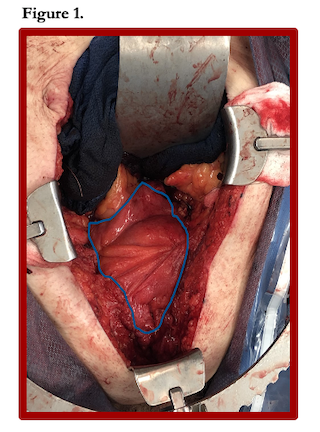Back
Poster, Podium & Video Sessions
Moderated Poster
MP25: Trauma/Reconstruction/Diversion: Ureter (including Pyeloplasty) and Bladder Reconstruction (including fistula), Augmentation, Substitution, Diversion
MP25-20: Demusocalized detrusor muscle flaps for complex urethral fistula
Saturday, May 14, 2022
10:30 AM – 11:45 AM
Location: Room 228
Matthew Loecher*, Ramphis Morales-Lopez, Michael Metro, Philadelphia, PA
- ML
Matthew S. Loecher, MD
Temple University Hospital
Poster Presenter(s)
Introduction: Radiation associated rectourethral (RUF) and urosymphyseal fistulas (USF) are complex urologic problems that often require permanent urinary diversion. While reconstruction for RUF and USF have been studied in small case series with good short-term outcomes, little information exists on the optimal approach when reconstruction fails or is not feasible. We present a novel approach to fistula management with subtotal cystectomy with urinary diversion and creation of demucosalized detrusor muscle flaps (DDMF) for pelvic interposition. We propose that this technique optimizes reconstructive principles to improve wound healing and eliminate empty space in a hostile and infected field.
Methods: We performed a retrospective review of eight patients with radiation-associated USF or RUF treated with subtotal cystectomy with DDMFs and ileal conduit performed by a single surgeon between January 2018 and October 2021. Surgical technique and preoperative work up was described (Figure 1). Preoperative data, radiation history and prior interventions were collected. Short-term outcomes and peri-operative complications were recorded. (Table 1.)
Results: All men had been treated for prostate cancer with radiation therapy without evidence of biochemical recurrence. TUR of a BNC was the most common inciting factor. Median age was 76.5 years old (range 71-81). Mean length of stay was 9.5 days. Median follow up was 13.5 months (range 4-24). All USF patients have not had reoccurrence of pelvic sepsis or pubic osteomyelitis at follow up. All RUF patients had been able to re-establish bowel continuity. Thirty-day post-operative complications were all Clavien-Dindo 1 or 2.
Conclusions: DDMFs are a safe and feasible option for patients who fail or are not candidates for definitive reconstruction of RUF or USF. We propose that using vascularized muscle flaps allows for tissue interposition without added morbidity, need for distant muscle flaps or need for plastic surgery consultation.
Source of Funding: None


Methods: We performed a retrospective review of eight patients with radiation-associated USF or RUF treated with subtotal cystectomy with DDMFs and ileal conduit performed by a single surgeon between January 2018 and October 2021. Surgical technique and preoperative work up was described (Figure 1). Preoperative data, radiation history and prior interventions were collected. Short-term outcomes and peri-operative complications were recorded. (Table 1.)
Results: All men had been treated for prostate cancer with radiation therapy without evidence of biochemical recurrence. TUR of a BNC was the most common inciting factor. Median age was 76.5 years old (range 71-81). Mean length of stay was 9.5 days. Median follow up was 13.5 months (range 4-24). All USF patients have not had reoccurrence of pelvic sepsis or pubic osteomyelitis at follow up. All RUF patients had been able to re-establish bowel continuity. Thirty-day post-operative complications were all Clavien-Dindo 1 or 2.
Conclusions: DDMFs are a safe and feasible option for patients who fail or are not candidates for definitive reconstruction of RUF or USF. We propose that using vascularized muscle flaps allows for tissue interposition without added morbidity, need for distant muscle flaps or need for plastic surgery consultation.
Source of Funding: None



.jpg)
.jpg)